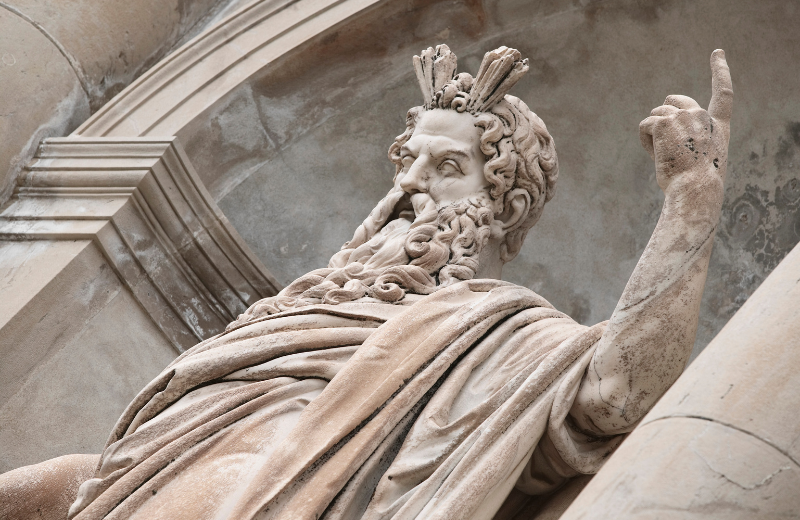If you’ve ever been captivated by Greek mythology, you may have come across the enigmatic figure of Ganymedes. His story intertwines themes of beauty, divine favour, and a unique position among the gods. Let’s explore who Ganymedes was, his myths, his symbolic significance, and why his story continues to fascinate.
Jump to:
Recommended for you!
Best SellersWho Was Ganymedes?
Ganymedes was a mortal prince in Greek mythology, known for his extraordinary beauty and noble lineage. As the son of Tros, the founder of Troy, he was considered one of the most attractive mortals to have ever lived, captivating even the king of the gods, Zeus.
Ganymedes’ allure led to his abduction by Zeus, who either transformed into an eagle or sent one to carry the young prince to Mount Olympus. There, he was granted immortality and the esteemed position of cupbearer of the gods, serving nectar and ambrosia to the Olympians. His story symbolises divine favour and the interplay between the mortal and immortal worlds.
Myths Featuring Ganymedes

As one of the most celebrated mortal figures in Greek mythology, Ganymedes’ myths explore themes of favouritism from the gods and the unique bond between mortals and immortals:
Zeus and Ganymedes: The Myth of Divine Abduction
The myth of Zeus and Ganymedes is one of the most famous in Greek mythology. According to the tale, Zeus was so captivated by Ganymedes’ beauty that he transformed into an eagle and carried the young prince to Mount Olympus. In some versions, Zeus sent his eagle rather than taking the form himself. Ganymedes was granted immortality and given the esteemed role of cupbearer of the gods, serving nectar and ambrosia to the Olympians.
This story has often been interpreted as a symbol of divine favour and the connection between mortals and gods. It also highlights Zeus’ penchant for pursuing mortals, though the nature of his relationship with Ganymedes has been a topic of debate. Some interpretations suggest it represents a mentor-mentee bond, while others point to the cultural norms of ancient Greece, where relationships between older men and younger males were idealised in certain contexts.
The Constellation Aquarius and Ganymedes
One lesser-known myth connects Ganymedes to the constellation Aquarius. According to legend, Ganymedes’ role as the cupbearer inspired Zeus to place him among the stars as Aquarius, the water-bearer. This celestial transformation symbolises his eternal connection to the gods and the heavens. The constellation’s association with water may also reflect the life-giving nectar Ganymedes served, further cementing his symbolic role in mythology.
Ganymedes’ Role and Significance Among the Gods
As the cupbearer of the gods, Ganymedes held a position of great honour. His role symbolised the sharing of divine essence, as nectar and ambrosia were believed to grant immortality. Ganymedes replaced Hebe, the goddess of youth, in this role, marking him as a figure of eternal beauty and youthfulness.
Beyond his practical duties, Ganymedes became a symbol of the bond between mortals and the divine. His ascension to Mount Olympus is often seen as a representation of how the gods could elevate humans to their ranks, rewarding exceptional qualities like beauty or virtue.
Symbols Associated with Ganymedes

Ganymedes’ story is rich with symbolism, and the elements associated with him reveal his unique role in Greek mythology and his enduring legacy.
- The eagle: Represents Ganymedes' abduction by Zeus. This majestic bird often symbolises strength, power, and divine intervention in Greek mythology. In artistic depictions, Ganymedes is frequently shown with an eagle, either perched beside him or carrying him skyward.
- The cup: Reflects his role as the gods’ cupbearer. The act of serving nectar and ambrosia signifies his status and the intimacy of his connection with the Olympians.
- Aquarius: Links Ganymedes to the zodiac as the water-bearer. This association stems from the belief that he inspired the constellation, symbolising his eternal bond with the heavens and his life-giving role.
Ganymedes in Modern Interpretations

The story of Ganymedes has resonated through time, inspiring countless works of art and literature. His tale has been depicted in sculptures, vase paintings, and Renaissance art, often highlighting his beauty and the dramatic moment of his abduction by the eagle.
In modern times, Ganymedes has become a symbol of youthful allure and the interplay between human and divine realms. His association with Aquarius further cements his presence in contemporary culture, connecting his myth to astrology.
Ganymedes also serves as a figure of fascination in LGBTQ+ discussions about representation in mythology. His relationship with Zeus, whether interpreted as romantic or symbolic, is often cited as an example of ancient acceptance of diverse forms of affection. This adds a layer of relevance to his story in contemporary dialogues about identity and relationships.
Additionally, Ganymedes’ narrative has found a place in popular media, referenced in literature, theatre, and even astronomy. The naming of Jupiter’s largest moon, Ganymede, reflects the enduring impact of his myth on science and exploration. This celestial tribute highlights how his story bridges mythology and the modern quest for understanding the universe.
Recommended for you!
Best SellersInteresting Facts About Ganymedes
- Ganymedes’ name is pronounced “GAN-i-meed,” derived from Greek words meaning “gladdening” and “thought” or “mind.”
- He is often depicted wearing Phrygian clothing, reflecting his origins as a Trojan prince.
- The planet Jupiter, named after Zeus’ Roman counterpart, has a moon called Ganymede, highlighting the myth’s astronomical influence.
- In Shakespeare’s As You Like It, Rosalind disguises herself as a boy named Ganymede, referencing the myth.
- Ganymedes is one of the few mortals in Greek mythology who achieves immortality without enduring a tragic or heroic ordeal.
Explore More About Greek Mythology
Ganymedes’ myth offers a glimpse into the fascinating complexities of Greek mythology. If you’re captivated by these ancient stories and their modern interpretations, deepen your understanding with our Greek Mythology Diploma Course at Centre of Excellence. This fascinating course offers an in-depth exploration of the myths, legends, and cultural significance of ancient Greece. By enrolling today, you can enjoy a discounted price of just £29.













